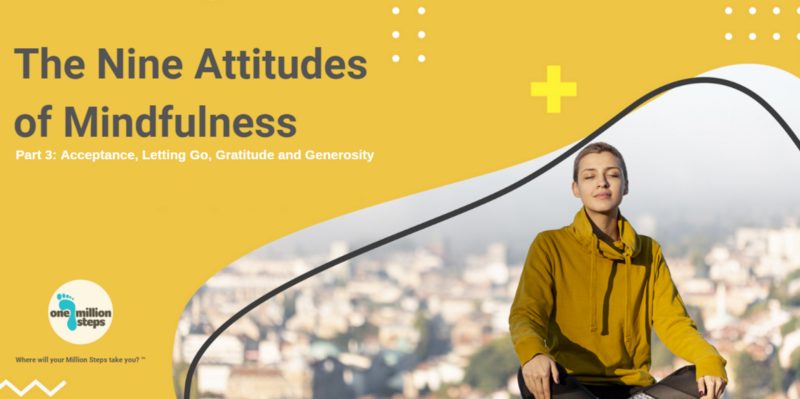
Part 3: Acceptance, Letting Go, Gratitude and Generosity
This is Part 3 of our Nine Attitudes of Mindfulness.
To read Part 1, please visit here and for Part 2 please visit here
Once again, for the work on the Nine Attitudes of Mindfulness, I am immensely grateful for the video interviews with Jon Kabat-Zinn by Minds Unlimited, based in Sweden. They are a truly invaluable resource and insight into what defines the idea of mindfulness.
Acceptance: The 9 Attitudes of Mindfulness
Acceptance has had some pretty bad press recently. That somehow acceptance means accepting one’s place in life or the hopelessness of a situation.
Far from it. It is actually the foundation stone of courage and change.
In fact, it takes exceptional courage. And I would say; the sort of courage that we sometimes see in exceptional people.
This is where we are (I am). Over there is where we want to be (How I want to live). Now let’s understand/accept the situation, draw up a plan and make the changes necessary so we can have a better existence/situation/future.
That is the fundamental premise of Acceptance in Mindfulness.
Acceptance is a very active process, there is nothing passive about it, it’s not passive resignation but an act of recognition that things are the way they are… Acceptance doesn’t mean we cant work to change the world, or circumstances, but it means that unless we accept things as they are, we will try to force things to be as they are not and that can create an enormous amount of difficulty Jon Kabat-Zinn Source Google Books
“Acceptance doesn’t, by any stretch of the imagination, mean passive resignation. Quite the opposite. It takes a huge amount of fortitude and motivation to accept what is; especially when you don’t like it, and then work wisely and effectively as best you possibly can with the circumstances you find yourself in and with the resources at your disposal, both inner and outer, to mitigate, heal, redirect, and change what can be changed.” John Kabat-Zinn Coming to Our Senses: Healing Ourselves and the World Through Mindfulness(p.407)
Somehow, when I think of Acceptance, it reminds me of the serenity prayer.
“Grant to us the serenity of mind to accept that which cannot be changed. Courage to change that which can be changed. And wisdom to know the one from the other” Reinhold Niebuhr
Letting Go: The 9 Attitudes of Mindfulness
Cultivating the attitude of letting go, or non-attachment, is fundamental to the practice of mindfulness.
When we start paying attention to our inner experience, we rapidly discover that there are certain thoughts and feelings and situations that the mind seems to want to hold on to. If they are pleasant, we try to prolong these thoughts or feelings or situations, stretch them out, and conjure them up again and again.
Similarly, there are many thoughts and feelings and experiences that we try to get rid of or to prevent and protect ourselves from having because they are unpleasant and painful and frightening in one way or another. In the meditation practice, we intentionally put aside the tendency to elevate some aspects of our experience and to reject others. Instead, we just let our experience be what it is and practice observing it from moment to moment Jon Kabat-Zinn Source Google Books
And with further clarity, Kabat-Zinn explains it as Letting Go” as “Letting Be”
When people say “Let it go,” what they really mean is “Get over it,” and that’s not a helpful thing to say. It’s not a matter of letting go — you would if you could. Instead of “Let it go,” we should probably say “Let it be”; this recognizes that the mind won’t let go and the problem may not go away, and it allows you to form a healthier relationship with what’s bothering you.
Gratitude and Generosity: The 9 Attitudes of Mindfulness
There are two quotes that I would like to use to close off our three-part series on the Nine Attitudes of Mindfulness
What are Gratitude and Generosity?
To me, they are two sides of the same coin. And if we think about it carefully, they are often found together because they need each other. In a sense, they feed off each other in a circular process that keeps getting stronger.
I often say to people, “To be grateful is the awareness of noticing kindness and never taking anything for granted”
Something good has happened. Someone has shown you kindness. There is usually a reason behind the action or the event (after all an event may be the result of a chain of actions).
It’s very rarely just random or what we may call luck. There was action. It was taken for a reason. And it was directed at you (or you became a beneficiary whether intended or not)
That good action deserves some re-action from us. And it is shown as gratitude. The awareness of the action and the re-action.
A simple meaningful thank you could be a beginning. An act of kindness in return or passed on because you are grateful is generosity.
This gratitude/generosity circular process grows for you and ON YOU. But it has an impact on the gratitude/generosity circular processes of everyone you meet, and in turn, has an impact on the gratitude/generosity circular processes of others they meet.
Will your gratitude and generosity be the action that helps spin that process just a little more, to keep it going, to let it get stronger? Not just for you, but for the world ahead of you. We need it to be a kinder place.
Because that is where we are all travelling to and through. The world ahead of us.
“If the only prayer you said in your whole life was ‘thank you’ that would suffice” Ekhart Tolle
“To educate yourself for the feeling gratitude means to take nothing for granted, but to always seek out and value the kindness that will stand behind the action. Nothing that is done for you is a matter of course. Everything originates in a will for the good, which is directed at you. Train yourself never to put off the word or action for the expression of gratitude” Albert Schweitzer
“Giving…helps us become more mindful of our inner wealth. By practising mindfulness of generosity, by giving, and by observing its effects on ourselves and others, we are…discovering expanded versions of ourselves. Jon Kabat-Zinn Wherever You Go, There You Are
People who keep gratitude journals on a weekly basis have been found to exercise more regularly, have fewer physical symptoms, feel better about their lives as a whole, and feel more optimistic about their upcoming week as compared to those who keep journals recording the stressors or neutral events of their lives.
Daily discussion of gratitude results in higher reported levels of alertness, enthusiasm, determination, attentiveness, energy, and sleep duration and quality. Grateful people also report lower levels of depression and stress, although they do not deny or ignore the negative aspects of life.
People who think about, talk about, or write about gratitude daily are more likely to report having helped someone with a personal problem or offered emotional support to another person. Jon Kabat-Zinn Source Google Books
To find out more about the Million Steps Challenge and how we can help you, your business or charity, please visit https://millionsteps.com
Or Register your organisation interest: Million Steps CoVid-19 Package here
